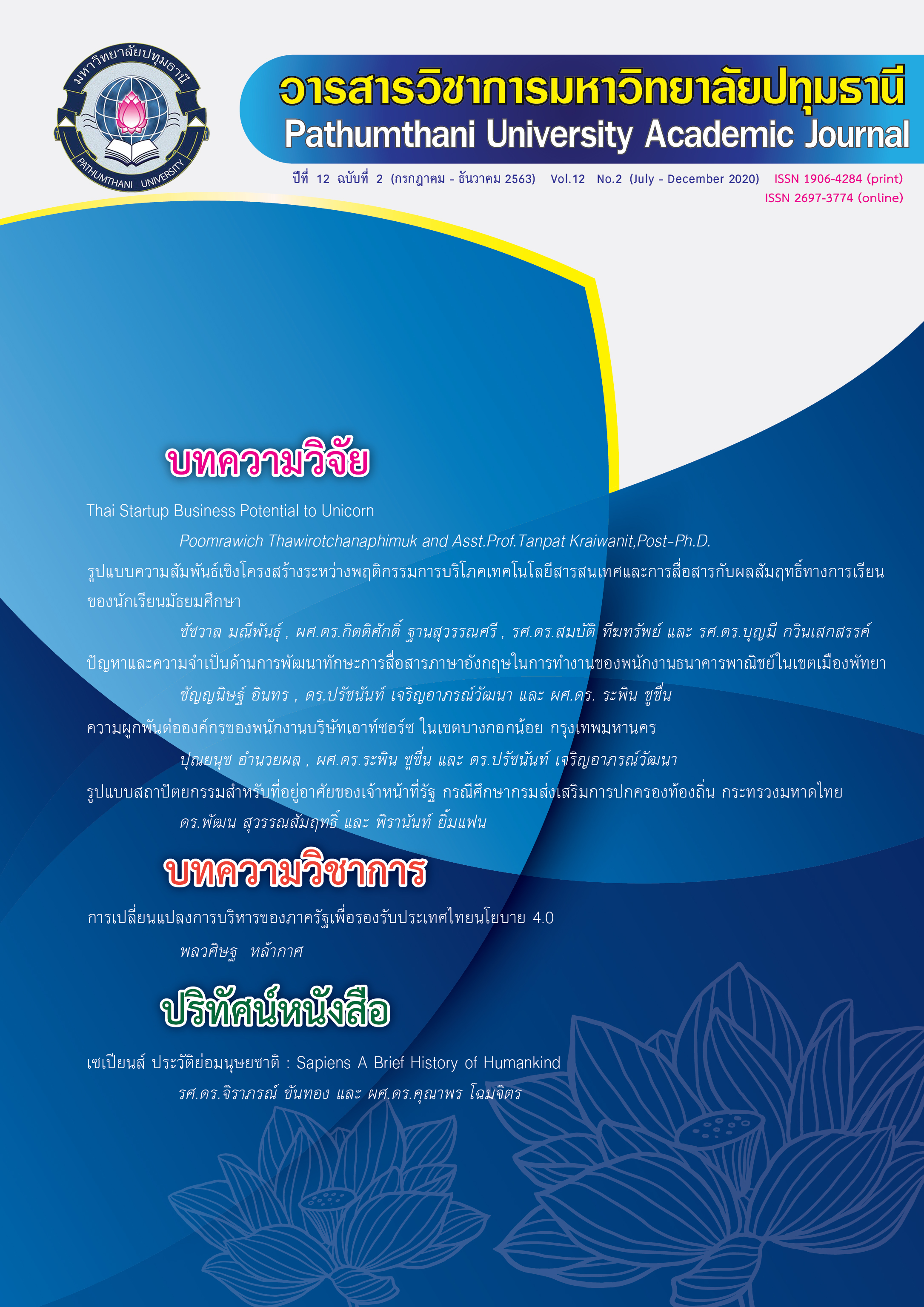THE SEVANT LEADERSHIP OF SCHOOL ADMINISTRATORS UNDER PHATTHALUNG PRIMARY EDUCATIONAL SERVICE AREA OFFICE 1
Keywords:
servant leadership, school administrators, Phatthalung Primary Educational Service Area Office 1Abstract
This study aimed 1) to investigate the servant leadership of school administrators under the Phatthalung Primary Educational Service Area Office 1, and 2) to explore the development approach of the servant leadership of school administrators under the Phatthalung Primary Educational Service Area Office 1.Research samples included 285 teachers in the schools under the Phatthalung Primary Educational Service Area Office 1, derived from simple random sampling in the academic year 2018. The interview's key informants consisted of five school administrators under the Phatthalung Primary Educational Service Area Office 1. The instruments for data collection were questionnaires and interview forms. The researcher employed the statistics included frequency, percentage, mean, standard deviation, and content analysis, to analyze data. The results revealed that 1) the servant leadership of school administrators under the Phatthalung Primary Educational Service Area Office 1 showed a high level in an overview. 2) The development approach of school administrators' servant leadership under the Phatthalung Primary Educational Service Area Office 1 was conducted by seven areas. (1) Understanding and empathy included reaching out to teachers and educational personnel's feelings and understanding individual differences. (2) Maintaining a person consisted of genuine leadership, ensuring leadership to lead the organization to success, constant self-improvement, oneself, and profession. (3) Realization included understanding other people, calming down, and controlling emotions, leading to fairly adjusting situations and solving problems. (4) Convincing included psychology for managing work, building leadership, and working motivation. (5) Conceptual creation included creating own dreams to the implementation, and real speaking and action, result in obviousness, systematic schools work, implementation on management principles ultimately, and believing in administrator to accomplish performance. (6) Service mind referred to systematic work, clear visualization of educational institutions, designing the school administration for mobilizing quality education, development of teachers, and academic personnel through internal supervision projects. (7) Personnel development included work motivation, continuing teacher and education personnel development, teachers and personnel receiving self-developed and professional development.
References
คมกฤช ประการะสังข์. (2559). ภาวะผู้นำแบบผู้รับใช้ของผู้บริหารสถานศึกษาที่ส่งผลต่อการบริหารแบบมีส่วนร่วมในการบริหารงานของสถานศึกษา สังกัดสำนักงานเขตพื้นที่ การศึกษาประถมศึกษาชลบุรี เขต 1. วิทยานิพนธ์ปริญญาครุศาสตรมหาบัณฑิต. มหาวิทยาลัยราชภัฏราชนครินทร์.
ทองอินทร์ อุบลชัย. (2556). ความสัมพันธ์ระหว่างภาวะผู้นำแบบผู้รับใช้ของผู้บริหารสถานศึกษากับการดำเนินงานระบบการดูแลช่วยเหลือนักเรียนของโรงเรียน สังกัดสำนักงานเขตพื้นที่การศึกษาประถมศึกษาเลย เขต 1. วิทยานิพนธ์ปริญญาครุศาสตรมหาบัณฑิต สาขาวิชาการบริหารการศึกษา. มหาวิทยาลัยราชภัฎเลย.
ปองภพ ภูจอมจิตร. (2558). การพัฒนาตัวบ่งชี้ภาวะผู้นำแบบใฝ่บริการของผู้บริหารสถานศึกษาขั้นพื้นฐาน. วิทยานิพนธ์ปริญญาครุศาสตรดุษฏีบัณฑิต สาขาการบริหารจัดการการศึกษา. มหาวิทยาลัยราชภัฏมหาสารคาม.
พิมลพรรณ เพชรสมบัติ. (2560). ทักษะการบริหารของผู้บริหารมหาวิทยาลัยเทคโนโลยีราชมงคลธัญบุรี จังหวัดปทุมธานี. ปทุมธานี: มหาวิทยาลัยเทคโนโลยีราชมงคลธัญบุรี.
สมศักดิ์ พรมชาย. (2558).ภาวะผู้นำแบบผู้รับใช้ของผู้บริหารสถานศึกษา ตามความคิดเห็นของครู สังกัดสำนักงานเขตพื้นที่การศึกษาประถมศึกษาสงขลา เขต 3. วิทยานิพนธ์ปริญญาศึกษาศาสตรมหาบัณฑิต. มหาวิทยาลัยหาดใหญ่.
สุรัฐ ศิลปอนันต์. (2545). กระบวนการปฏิรูปโรงเรียนที่มีประสิทธิภาพ. กรุงเทพมหานคร : ด่านสุทธาการพิมพ์.
บังอร ไชยเผือก. (2550). การศึกษาคุณลักษณะของผู้นำแบบผู้รับใช้และบรรยากาศของโรงเรียนคาทอลิก สังกัดคณะภคินีพระกุมารเยซู. สารนิพนธ์ปริญญาการศึกษามหาบัณฑิต. มหาวิทยาลัยศรีนครินทรวิโรฒ.
ยงยุทธ เกษสาคร. (2542). ภาวะผู้นำและการจูงใจ. กรุงเทพมหานคร : สถาบันราชภัฏสวนดุสิต.
อารี พันธ์มณี. (2547). ฝึกให้เป็นคิดให้สร้างสรรค์. กรุงเทพมหานคร : สํานักพิมพ์ใยไหม.
อนุวัฒน์ วิภาคธำรงคุณ. (2553). การศึกษาคุณลักษณะภาวะผู้นำแบบรับใช้ของผู้บริหารสถานศึกษาในเครือมูลนิธิคณะเซนต์คาเบรียลแห่งประเทศไทย. สารนิพนธ์ปริญญาการศึกษามหาบัณฑิต สาขาวิชาการบริหารการศึกษา. มหาวิทยาลัยศรีนครินทรวิโรฒ.
อมรรัตน์ ศรีทอง. (2558). ภาวะผู้นำแบบผู้รับใช้ของผู้บริหารที่ส่งผลต่อวัฒนธรรมโรงเรียนของโรงเรียน ในสังกัดสำนักงานเขตพื้นที่การศึกษามัธยมศึกษา เขต 9. วิทยานิพนธ์ปริญญาครุศาสตรมหาบัณฑิต สาขาวิชาการบริหารการศึกษา. มหาวิทยาลัยราชภัฏนครปฐม.
Cronbach, L. J. (1970). Essentials of Psychological Test. (5th ed). New York: Harper Collins.
Krejcie, R.V. Morgan, D.W. (1970, Autumn).“Determining Sample Size for Research Activities”. in Educational and Psychological Measurement. Vol.30 (No.3) : pp.608 – 610.
Greenleaf, R. K. (1977). The servant leadership: A journey into the nature of legitimate Power and greatness. New York: Paulist Press.
Owens, 1981; LC Subject: Owens, Bob African American football coaches; Local Collection ID: UA_REF_3; Repository: University of Oregon. Libraries.
Thomson, C.H. (2005). The public School Superintendent and Servant Leadership. Dissertation, Ed.D. (Doctor of Education). Wisconsin : Wisconsin University
Wong, N. (2005). Servant leadership: An opponent – process model and the revised servant Leadership profile. (Master’s thesis, Regent University, Virginia, USA).
Yukl, G. (1998). “Managerial Leadership A Review of Theory and Research”. Journal of Management, 15, 251-289.
Downloads
Published
How to Cite
Issue
Section
License
บทความที่ได้รับการตีพิมพ์เป็นลิขสิทธิ์ของวารสารมหาวิทยาลัยปทุมธานี
ข้อความที่ปรากฎในบทความแต่ละเรื่อง เป็นความคิดเห็นส่วนตัวของผู้เขียน กองบรรณาธิการไม่จำเป็นต้องเห็นด้วยเสมอไป และไม่มีส่วนรับผิดชอบใด ๆ ถือเป็นความรับผิดชอบของผู้เขียนแต่เพียงผู้เดียว



